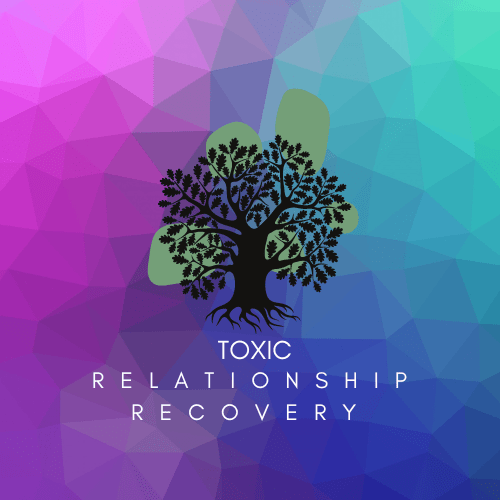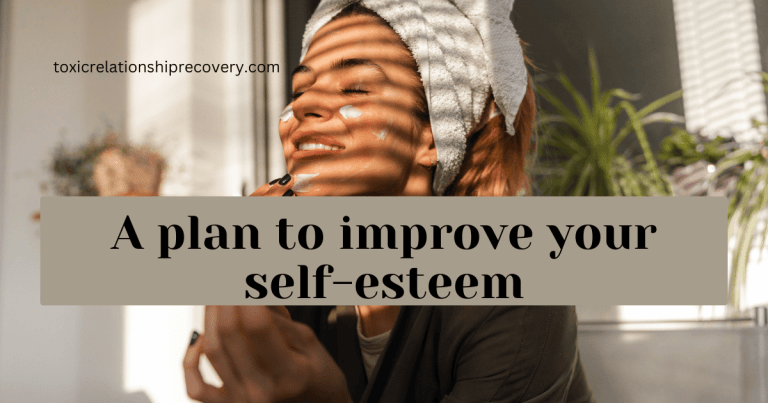Reclaiming Your Life After a Toxic Relationship
Table of Contents
Are you feeling overwhelmed by the demands of your daily life? Do you feel like you’re stuck in a rut and can’t seem to break free? If so, you’re not alone. Many people struggle with feeling like they’ve lost control of their lives, but the good news is that it’s never too late to start taking action toward reclaiming your life after a toxic relationship and start living on your terms.
Reclaiming your life means taking back control of your time, your energy, and your priorities. It’s about identifying what’s truly important to you and making sure that those things are given the attention they deserve.
This might mean saying no to commitments that don’t align with your values, or it might mean making time for activities that bring you joy and fulfillment. Whatever it looks like for you, the key is to be intentional about how you spend your time and energy.
Reclaiming your life can be a challenging process at the end of any relationship, and this is especially true after a toxic relationship.
However, it’s also incredibly rewarding. When you take control of your life, you’ll find that you have more energy, more clarity, and more purpose.
You’ll be able to focus on the things that matter most to you, and you’ll feel a sense of satisfaction and fulfillment that comes from living a life that’s aligned with your values.

So if you’re ready to take the first step towards reclaiming your life after a toxic relationship, read on for some tips and strategies that can help you get started.
Recognizing the Signs of a Toxic Relationship
If you’re feeling drained, devalued, or consistently disrespected in your relationship, it may be a sign that the relationship is toxic. It’s important to be aware of the signs of a toxic relationship so that you can avoid them in the future.
1. Understanding Emotional Abuse
Emotional abuse can be tricky to recognize because it doesn’t leave physical marks.
It can take many forms, including:
- constant criticism
- belittling
- gaslighting
- controlling behavior
Emotional abuse can leave you feeling isolated, anxious, and depressed. If you’re experiencing emotional abuse, it’s important to seek help and support. This is also true if you are suffering from the aftermath of emotional abuse.
2. Identifying Physical Abuse
Physical abuse is a clear sign of a toxic relationship.
It can include hitting, pushing, or other forms of physical harm. If you’re experiencing physical abuse, it’s important to seek help immediately. You can reach out to a friend, family member, or professional for support.
Don’t make excuses for your partner, and don’t convince yourself that it will improve because it never does.
3. Spotting Red Flags in a Romantic Relationship
Many red flags can indicate a toxic relationship. Some of these include:
- jealousy
- controlling behavior
- a lack of respect for your boundaries
- constantly criticizing you
- making you feel guilty through emotional manipulation
Unhealthy Relationships vs Healthy Relationships
In a healthy relationship, both partners respect each other’s boundaries and communicate openly and honestly. On the opposite side of the scale is the unhealthy relationship, where one partner may try to control or manipulate the other.
It’s important to recognize the signs of an unhealthy relationship and seek help. I know that this is often easier said than done. When I was in this situation, I felt ashamed, blamed myself for the abuse, and tried to fix the relationship by going into survival mode instead of reaching out for help.
This behavior did not help me, and it took a long time for me to take the steps toward reclaiming my life. Don’t have regrets, start reclaiming your life.
Recognizing the signs of a toxic relationship is the first step toward reclaiming your life. You deserve to be in a healthy, respectful relationship.

Understanding the Impact of an Abusive Relationship
If you have been in an abusive relationship, it is important to understand the impact it can have on your mental and physical health. The trauma of abuse can be long-lasting and may affect you in the future.
1. Effects on Mental Health
Abusive relationships can have a significant impact on your mental health. You may experience feelings of anxiety, depression, and low self-esteem. The trauma of abuse can exacerbate these emotions and make it challenging to end the relationship.
2. Impact on Physical Health
Toxic relationships can also have a significant impact on your physical health. The stress of living in an abusive relationship can lead to a range of physical health problems, including high blood pressure, heart disease, and digestive issues.
3. The Trauma Bond
One of the most challenging aspects of leaving an abusive relationship is the trauma bond that often develops between you and your abuser.
This bond is created through a cycle of abuse and love bombing, and it can be difficult to break. Even when you recognize that the relationship is unhealthy, you may feel unable to leave due to the trauma bond.
If you are in an abusive relationship, it is important to understand the impact it can have on your mental and physical health and take steps toward reclaiming your life and moving forward in a positive direction.
The First Step: Leaving Your Toxic Partner
If you have decided to take steps toward reclaiming your life, the first step is to leave your toxic partner. This can be a difficult decision, and ultimately it is your decision, but it is necessary for your safety and well-being.
Here are some steps you can take to make the process easier:
1. Creating a Safety Plan
Before you leave your toxic partner, it is essential to create a safety plan. This plan should include where you will go, who you will contact, and what you will take with you.
You should also identify safe places to stay, such as a friend’s house or a shelter. It is important to have a plan in place to ensure your safety. Leaving these relationships can be very unpredictable, and a safety plan is a necessity.
2. Seeking Professional Help
Leaving a toxic partner is emotionally and mentally challenging. Seeking professional help can provide you with the support you need to make the process easier.
A therapist or counselor can help you work through your emotions and develop coping strategies.
Contacting the National Domestic Violence Hotline
If you are in immediate danger, contact the National Domestic Violence Hotline at 1-800-799-SAFE (7233). They can provide you with resources and support to help you leave your toxic partner safely. They can also connect you with local shelters and support groups.
Leaving a toxic partner is the first step towards reclaiming your life.

Reclaiming Your Life After a Toxic Relationship
If you’ve recently ended a toxic relationship, you may not know where or how to start reclaiming your life. However, by focusing on personal growth, developing emotional independence, and establishing healthy boundaries, you can begin to take back control, which will give you a great sense of freedom.
1. Focusing on Personal Growth
One of the best ways to work toward reclaiming your life after a toxic relationship is to focus on your personal growth.
This means taking the time to reflect on your past relationships and learning from your mistakes. By doing so, you can begin to identify areas of your life that need improvement and work towards becoming a better version of yourself.
Don’t get me wrong; this does not mean that you did anything to deserve the abuse. I believe that toxic people target people who have low self-esteem, and are people-pleasers without boundaries. So these are the areas that need work to ensure a better future for you.
To start your personal growth journey, consider the following:
- Identify your strengths and weaknesses
- Set goals for yourself
- Take up a new hobby or activity
- Surround yourself with positive and supportive people
Personal growth is a continuous process that takes time. Be patient and kind to yourself as you work towards your goal of reclaiming your life after a toxic relationship.
2. Developing Emotional Independence
Another important step in reclaiming your life after a toxic relationship is developing emotional independence. This means learning to rely on yourself for emotional support and validation instead of seeking it from others.
To develop emotional independence, consider the following:
- Practice self-care regularly
- Learn to identify and regulate your emotions
- Set healthy boundaries with others
- Seek therapy or counseling if needed
By developing emotional independence, you can become more self-sufficient and less reliant on external validation and support.
3. Establishing Healthy Boundaries
Finally, establishing healthy boundaries is crucial when reclaiming your life after a toxic relationship. Boundaries help you protect your emotional and physical well-being and communicate your needs and expectations to others.
Setting boundaries will assist you in establishing expectations for how others should treat and respect you.

To establish healthy boundaries, consider the following:
- Identify your values and priorities
- Communicate your boundaries clearly and assertively
- Learn to say “no” when necessary without feeling guilty
- Surround yourself with people who respect your boundaries
Setting boundaries is not selfish; it’s an essential part of self-care and self-respect.
Reclaiming your life after a toxic relationship takes time and effort. It also takes courage and resilience.
I know that after a toxic relationship, you feel terrible, confused, and lonely, but I promise you that with time things will improve.
Healing Process: From Trauma to Recovery
If you have experienced trauma, it can be a long and difficult journey to heal. However, with time, patience, and the right tools, recovery is possible.
Understanding the role of time in healing, embracing the healing journey, and learning new ways to cope are all steps in the recovery process after a toxic relationship.
1. Understanding the Role of Time in Healing
It’s important to understand that healing from trauma takes time. There is no set timeline for recovery, and everyone’s healing journey is unique.
Some people may start to feel better after a few weeks or months, while others may take years to fully heal.
It’s important to be patient with yourself and to allow yourself the time you need to heal.
2. Embracing the Healing Journey
The healing journey can be difficult, but it’s necessary to embrace it. This means accepting that healing is a process and that it may not happen overnight.
It also means being willing to face your trauma and work through it, even when it’s painful. You will have bad days, but these will become less evident as time goes on.
Healing is possible.
3. Managing Anxiety from the breakup
Anxiety after a breakup is absolutely normal, especially after a toxic relationship. Understanding and managing breakup anxiety is a crucial part of your personal growth and healing.
Breakup anxiety often stems from a fear of loneliness, loss of identity, or uncertainties about the future.
While it’s natural to experience a range of emotions during this transitional phase, it’s important not to let anxiety consume you.
Effective coping strategies include seeking a support network of friends and family, focusing on self-care routines, and potentially consulting a mental health professional for guidance.
Utilizing mindfulness techniques can also help you become aware of your thoughts and feelings without judgment, thereby granting you a clearer perspective to re-evaluate your life’s priorities.
4. Learning New Ways to Cope
As you move forward on your healing journey, it’s essential to learn new habits so that you can live authentically. This may include practicing self-care, such as getting enough sleep, eating well, and exercising regularly.
It may also mean seeking support from family members, trusted friends, or a therapist. Learning new coping skills can help you manage your emotions and stress in a healthy way and can help you move forward on your healing journey.
Reclaiming your life after a toxic relationship is possible with patience and the right tools.
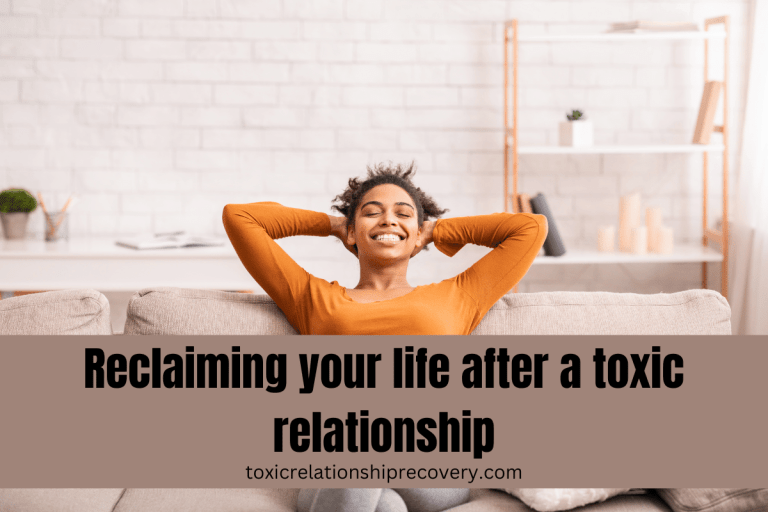
Building a Support System
When you’re looking at reclaiming your life after a toxic relationship, building a support system is an essential step.
A support system can be a group of people who provide you with emotional, mental, and practical support. It can be a network of family members, friends, or support groups.
Here are some ways to build a support system that works for you:
1. Reconnecting with Family Members
One of the first steps in building a support system is to reconnect with family members. Family members can be a great source of support, especially during difficult times. You can start by reaching out to family members you haven’t spoken to in a while.
Try to build a relationship with them by spending time together and getting to know them better. You can also talk to them about your goals and aspirations. They may be able to offer you advice and support.
2. Joining Support Groups
Another way to build a support system is to join support groups. Support groups allow you to connect with people who are going through similar experiences.
You can find support groups for various issues, including addiction, mental health, and chronic illness. Joining a support group can provide you with a safe space to share your thoughts and feelings. You can also learn from others who have gone through similar experiences.
Support groups are particularly useful if you have recently left a toxic relationship and have not yet reconnected with friends and family.
3. Creating a Support Network
Creating a support network is another way to build a support system. A support network can be a group of people who provide you with practical support, such as help with childcare or finances.
You can start by identifying people in your life who may be able to support you. This can include friends, family members, and colleagues. You can also reach out to community organizations or volunteer groups.
Creating a support network can help you feel more connected to your community.
Building a support system takes time and effort, but it’s an essential step in reclaiming your life after a toxic relationship. You don’t have to go through difficult times alone.
With the right support system in place, you can overcome challenges and achieve your goals.
Moving On: Starting a New Relationship
Starting a new relationship after a breakup can be intimidating. However, it can also be an opportunity to build new bonds and create healthy relationships.
However, I would not rush into a new relationship, take your time and focus on reclaiming your life after a toxic relationship.
Once you feel that you have healed, here are some tips to help you overcome the fear of a new relationship, identify the signs of a healthy relationship, and build new bonds.
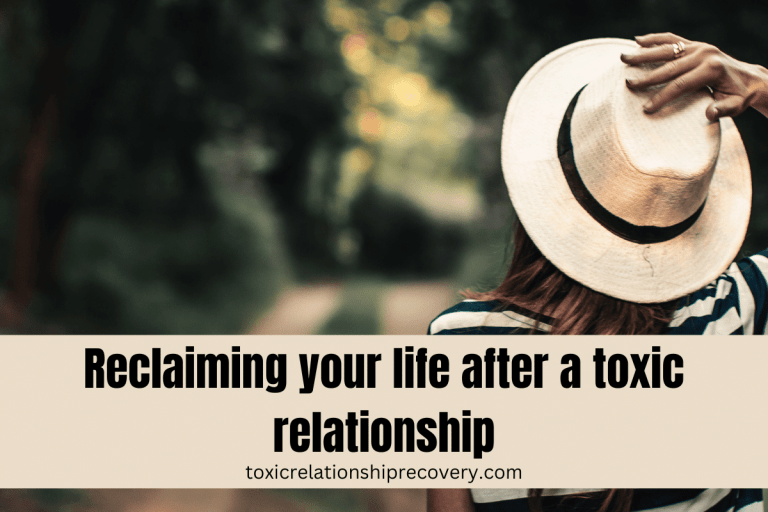
1. Overcoming the Fear of a New Relationship
Starting a new relationship can be scary, especially if you have been hurt in the past.
However, it is important to remember that not all relationships are the same. To overcome your fear, try to focus on the present and not on the past. Take things slow and don’t rush into anything.
Be honest with your partner about your fears and concerns, and communicate openly and honestly.
2. Identifying the Signs of a Healthy Relationship
It is important to know the signs of a healthy relationship.
A healthy relationship is built on trust, respect, communication, and mutual support. Look for a supportive partner who listens to you and respects your boundaries. A healthy relationship should also make you feel good about yourself and your life.
3. Building New Bonds
Building a new bond with someone takes time and effort. Take things slowly, and don’t rush into anything. Spend time getting to know your partner and sharing your interests and hobbies.
Be open and honest about your feelings, and communicate openly and respectfully. Building a new bond takes patience and effort, but it is a rewarding experience.
Starting a new relationship is a personal decision that should include taking the time to heal and move on from your past relationship.
Maintaining Your Emotional Well-being
Taking care of your emotional well-being is essential for reclaiming your life after a toxic relationship. Emotional well-being refers to your ability to handle life’s stresses, adapt to changes, and manage your emotions effectively.
Here are some ways to prioritize your emotional well-being:
1. Prioritizing Your Own Needs
You cannot pour from an empty cup, so it’s essential to prioritize your own needs. It’s okay to say no to things that don’t serve you or that you don’t have the energy for.
Setting boundaries is crucial for maintaining your emotional well-being. Be sure to schedule time for yourself to do things that bring you joy and relaxation.
2. Understanding and Expressing Your Own Emotions
It’s meaningful to understand and express your own emotions. Emotions are a natural part of being human, and it’s okay to feel them. Try to identify what you’re feeling and why you’re feeling that way. Journaling, talking to a trusted friend, or seeing a therapist are all great ways to express your emotions.
3. Taking Care of Your Physical Health
Taking care of your physical health is also essential for maintaining your emotional well-being. Exercise, eating a healthy diet, and getting enough sleep are all crucial for your overall well-being.
Additionally, you should avoid unhealthy coping mechanisms, such as drugs or alcohol, that can negatively impact your emotional well-being.
By taking care of yourself, you’ll be better equipped to handle life’s challenges and reclaim your life.
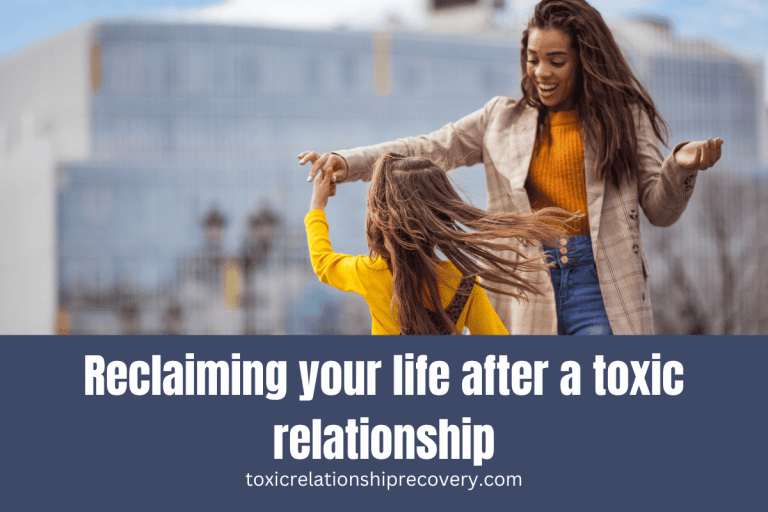
Frequently Asked Questions
1. How can you simplify your life and focus on what’s important?
Simplifying your life can help you focus on what’s truly important. Start by identifying what matters most to you and what you want to achieve. Then, eliminate unnecessary commitments and distractions that don’t align with your goals. Consider decluttering your physical and digital spaces and prioritizing your time accordingly. By simplifying your life, you can reduce stress, increase productivity, and find more fulfillment in your daily activities.
2. What steps can you take to regain your confidence?
Regaining your confidence can be a challenging but rewarding process. Start by identifying the root causes of your self-doubt, and then challenge negative self-talk with positive affirmations. Practice self-care, such as exercise, healthy eating, and getting enough sleep. Surround yourself with supportive people who encourage and uplift you. Take small steps towards your goals, and celebrate your wins, no matter how small. Remember that confidence is built up over time, and with patience and perseverance, you can regain your self-esteem.
3. What are some practical ways to reclaim your time?
Reclaiming your time starts with setting clear boundaries and prioritizing your commitments. Identify what tasks are essential and what can be delegated or eliminated. Use time management techniques, such as the Pomodoro technique or time blocking, to increase productivity and focus. Avoid multitasking and instead focus on one task at a time. Limit your use of social media and other distractions, and make time for activities that bring you joy and relaxation.
4. How can you redefine your values and priorities to reclaim your life?
Redefining your values and priorities can help you align your actions with your goals and live a more fulfilling life. Start by reflecting on what matters most to you and what you want to achieve in your personal and professional lives. Consider what values are important to you, such as honesty, integrity, or compassion. Then, prioritize your time and commitments accordingly and make choices that align with your values and goals. Remember that your values and priorities may shift over time, and it’s okay to reassess and adjust as needed.
5. What does it mean to establish healthy boundaries and reclaim your autonomy?
Establishing healthy boundaries means setting limits on what you will and won’t tolerate in your personal and professional relationships. It means communicating your needs and expectations clearly and respecting the needs and expectations of others. Reclaiming your autonomy means taking ownership of your decisions and actions and not letting others control or manipulate you. It means asserting your independence and building self-reliance. By establishing healthy boundaries and reclaiming your autonomy, you can build stronger, more authentic relationships and live a more fulfilling life.

Join our Facebook group
Reclaiming your life after a toxic relationship is not just about surviving but about thriving. It’s about rediscovering your self-worth, creating healthy boundaries, nurturing positive relationships, and daring to love and trust again.
It is by no means a linear journey, and there will be times when you may falter or stumble. In these moments, remember that it’s okay to seek help from supportive friends, family, or professional therapists.
Reclaiming your life after a toxic relationship is your opportunity to build a life that echoes your values, aspirations, and affections. It’s an invitation to explore the world with renewed faith, knowing you are now equipped with the wisdom gleaned from your past.
Take the time you need to heal and rebuild. The experience might have been bitter, but the recovery journey is empowering, leading to a stronger, wiser, and more resilient you.
Reclaiming your life after a toxic relationship signifies your refusal to settle for less than you deserve. It’s the first step towards creating a life full of love, respect, and happiness.
You have courage, and you are brave.
